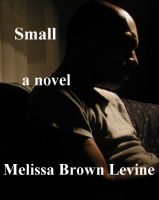
Riana and Hoil, Ansar’s parents, have a very volatile and disruptive relationship. Their fights really are more like a never-ending series of battles. In spite of how hollow their love is, Riana and Hoil still battle over the very few things that connect them – their son, Ansar, and their shared predisposition to violence.
Small is more character-driven than plot-driven. While there are indeed conflicts, overcoming them doesn’t seem like the purpose of the story until the very end, when the abuse and violence goes up about three notches. Up until that point, the book reads like a heart-wrenching slice of life about an abusive marriage built on violence and rape and an antisocial 19-year-old who copes by abusing himself.
The story is told from a variety of POVs. Since abuse often affects more than just the abuser and the abused, this is a very effective storytelling method. Readers get to see Riana’s ruthless desire for true love and the insecurities that have built up over the years as a result of being abused for many years herself. We see Hoil’s contradictory desire for peace and violence and his spiral downhill. Though the story begins at a point where abuse is something he can’t help but turn to, we do get to see where the abuse started through flashbacks about his time with his previous wife. As the story progresses, Hoil gets worse and worse. Then there are the sections dedicated to Ansar. His sanity, understandably enough, becomes more fragile with each chapter. Though he promised his best and only friend that he would stop cutting, it becomes impossible for him to completely quit with his parents loudly abusing each other all the time. Just as Hoil gets more outwardly abusive, Ansar gets more inwardly abusive.
Even the secondary main characters – Riana’s sister and Ansar’s best friend – get sections dedicated to their POV at the end of the book, when everyone is pretty much forced to face each other and confess their secrets. I both liked and disliked the conclusion. While I liked how high the stakes became and the confessions, I couldn’t shake the feeling that there wasn’t enough build-up leading to the very last action in the conclusion. As thus, at least for me, it felt random instead of unexpected.
After the prologue and first chapter, the writing becomes less experimental, though it’s well-written throughout beside the few instances where a word is missing or the wrong ‘your’ is used. In those first two chapters, there are a couple of beautiful sentences that stand out.
For instance, this sentence from page seven: ‘Riana was not the type of woman who could not be seen. A man had to keep an active eye on her if not for no other reason than to make certain she didn’t snatch his heart out of his chest when he wasn’t paying attention.’ The word choice says much more about Riana’s personality and appearance than any bland, formulaic sentence could. Fortunately, there are many sentences brimming with great imagery and comparisons throughout the book.
Small is not for the faint of heart, but it’s interesting and worth a read if you can handle the violence. It says a lot about the long-lasting effects of abuse.
Links
Get an Editorial Review | Get Amazon Sales & Reviews | Get Edited | Get Beta Readers | Enter the SPR Book Awards | Other Marketing Services






















Leave A Comment